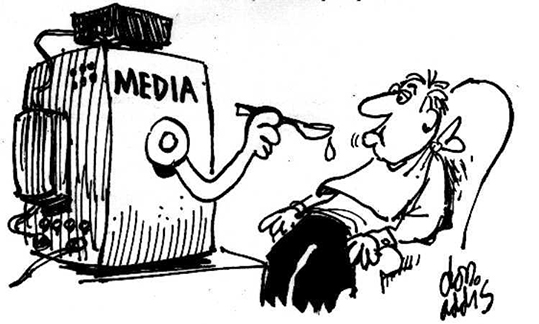What Are We Consuming?

I want to talk about what we consume, not just food and material stuff, but also what we consume with our eyes and ears.
Before looking at the intangibles we consume, let me briefly list the questions I think we need to ask ourselves when we purchase groceries and material goods.
Questions to ask at the grocery store:
What is the level of processing of the product I want to buy?
What are the ingredients and how many have been concocted in a lab? How many are ok?
What’s the overall value of the food? What are the hidden costs?
Who benefits from my purchase?
Where is it coming from, how is it grown and by whom?
Will this food purchase enhance or harm me and the Earth?
Questions to ask when we choose to buy a non-food item:
Where is it made?
By whom? Under what kinds of conditions?
What materials are used?
Is the container or packaging degradable? Recyclable?
What’s the impact on the environment and the community?
What about what we consume with our eyes and ears?
TV, magazines, radio, talk shows, video games, online news, newspapers, websites. Thich Nhat Hanh teaches that when you read a newspaper, magazine, or website, watch films or television, or even engage in conversation, you are engaged in consumption. “When we watch television and movies we consume, when we browse the internet we consume, when we listen to music or a conversation, we consume. And what we consume every day may be highly toxic. It may contain violence, craving, fear, anger, and despair.” Read the full article from The Lion's Roar here.
We ourselves know how a single news bulletin can touch off fear, despair, anger, anxiety, hatred, or helplessness. Clifford & I stopped watching network news a couple of years ago because violence and bad news were so dominant. We want to keep informed (I read the NY Times online), but stay mentally and emotionally steady and positive in the face of ongoing crises and violations.
Ain’t it awful!?
Of course it’s awful. We can all agree, no matter what our perspective, that what most of what we see around us is awful. We need information about what’s going on. We don’t want to turn a blind eye to the problems we face, but how much information do we take in that goes beyond essential news. Unconsciously or not, do we take in news to whet and support our appetite for more “ain’t it awful” stuff, to fuel our anger and hostility, which we transmit like radio waves all around us.
What’s your tipping point?
I’m not saying that we need to take the awful news lying down or passively. For example, if you read news that the standards for clean air and water are being cut, it’s only natural to feel shocked, heartsick and furious. (If you’re not, you might ask yourself, why not?) It is essential to grieve and be angry at such criminal acts, but we need to use that energy in a positive way to create change rather than simply adding that negative energy to the world. There’s a tipping point where appropriate outrage, anger or fear or sadness triggered by news is detrimental to our own well being and keeps us from being able to focus on the positive change that we can make.
The Butterfly Effect
Ever heard of the “Butterfly Effect?” The well-supported theory is that the weather of the world is so sensitive and interconnected that the movement of a butterfly’s wings in Alaska affects weather in Saudi Arabia. Imagining that my emotional energy emanates far beyond my physical self helps me to stay patient a little longer, complain a little less, be kinder a little more. As Rabbi Brian says in this short video, “Let’s take some of the hate that we have out of the mix and add some lovingkindness.”
It’s a lot easier to be negative, but it’s up to us whether we choose to generate more negative or positive energy. Wishing us all courage and wisdom to make the right choices.
Back to Blog